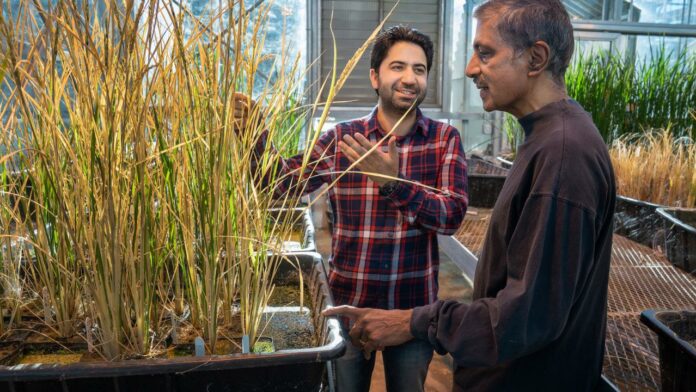UC Davis plant biologists and geneticists working with researchers in Europe and Africa find solutions to reduce the costs of planting rice, maintaining year-round crop yield
By BRANDON NGUYEN — science@theaggie.org
According to the U.S. Department of Agriculture, rice is a staple crop for more than half of the world’s population. However, for farmers, buying seeds annually in their hybrid genetic state, which has proven to perform more efficiently, can be expensive.
Fortunately, a recent breakthrough in consistently successful cloning of a hybrid rice strain has opened up new possibilities. Farmers may no longer have to purchase rice seeds every year. The study, led by plant biologists and geneticists from UC Davis in collaboration with an international team of researchers, suggested that this finding will help reduce the costs of planting the crop while maintaining its enhanced production and resistance to disease and climate change.
Hybrid vigor, which is described by plant biologists as a crop’s characteristic high yield and resiliency as a result of a specific genetic cross, has also been observed in rice and therefore, has become a point of interest for many farmers to improve the efficiency of the crop’s production. Venkatesan Sundaresan, a professor in the Department of Plant Biology and Plant Sciences, explained that the team’s goal to clone rice was rooted in this very scientific principle.
“Hybrid vigor is a phenomenon that people have observed in plants for a long time,” Sundaresan said. “This occurs when two inbred varieties of a type of crop are crossed or bred together, and the progeny are almost always more vigorous, high-yielding and resistant than the plant’s parents.”
However, when two hybrids are bred together, the following generation of plants does not exhibit the same level of high performance. Sundaresan and his team sought to find a way through cloning to maintain hybrid vigor in rice, a seed that is typically expensive for farmers to buy in its hybrid state.
“These low-income farmers can only get this type of rice from a hybrid seed producer, but it’s much more expensive than when compared to corn, for example,” Sundaresan said. “It would be great to increase the yield of using the same land and resources, from which you could sell at a price higher by 25%.”
In addition to the cost of hybrid rice seeds, the weather’s unpredictability pulled subsistence farmers away from the prospect of investment.
China is the only country that grows the majority of its rice as a hybrid due to the large support from its government, whereas only about 5% to 10% of farmers in other countries do.
To reduce the risks of investment, Gurdev Khush, adjunct professor emeritus in the Department of Plant Sciences at UC Davis and co-author on the study, highlighted the power of cloning in agriculture.
“If you can induce apomixis, the process by which some naturally occurring plants produce seeds that are exact, identical clones, then you can plant the same hybrid rice crop every year,” Khush said.
Inducing apomixis was only one part of the solution though. Rice does not undergo this process when producing its own seeds; rather, it undergoes meiosis, which creates progeny that are not genetic clones. Sundaresan and his team have found a way to prevent meiosis and artificially induce apomixis, ultimately maintaining hybrid vigor.
“The first step is to eliminate meiosis, which we did by genetically editing three genes called MiMe,” Sundaresan said. “The second step is to prevent fertilization, and we did this by turning on this gene in plants called the ‘baby boom’ gene, which can turn an egg cell into an embryo. With these two steps together, we were able to create hybrid clones with rice with 95% efficiency after many, many years.”
While the specific gene modifications cannot be applied to other staple crops, the same approach can. Sundaresan said that the implications of this study are huge for a growing global population.
“Being able to maintain the high yield in these hybrid rice seeds will be greatly beneficial to low-income farmers,” Sundaresan said. “Our study can help meet the needs of both consumers and producers without having to increase the use of land, water and fertilizers to unsustainable levels.”
Written by: Brandon Nguyen — science@theaggie.org




